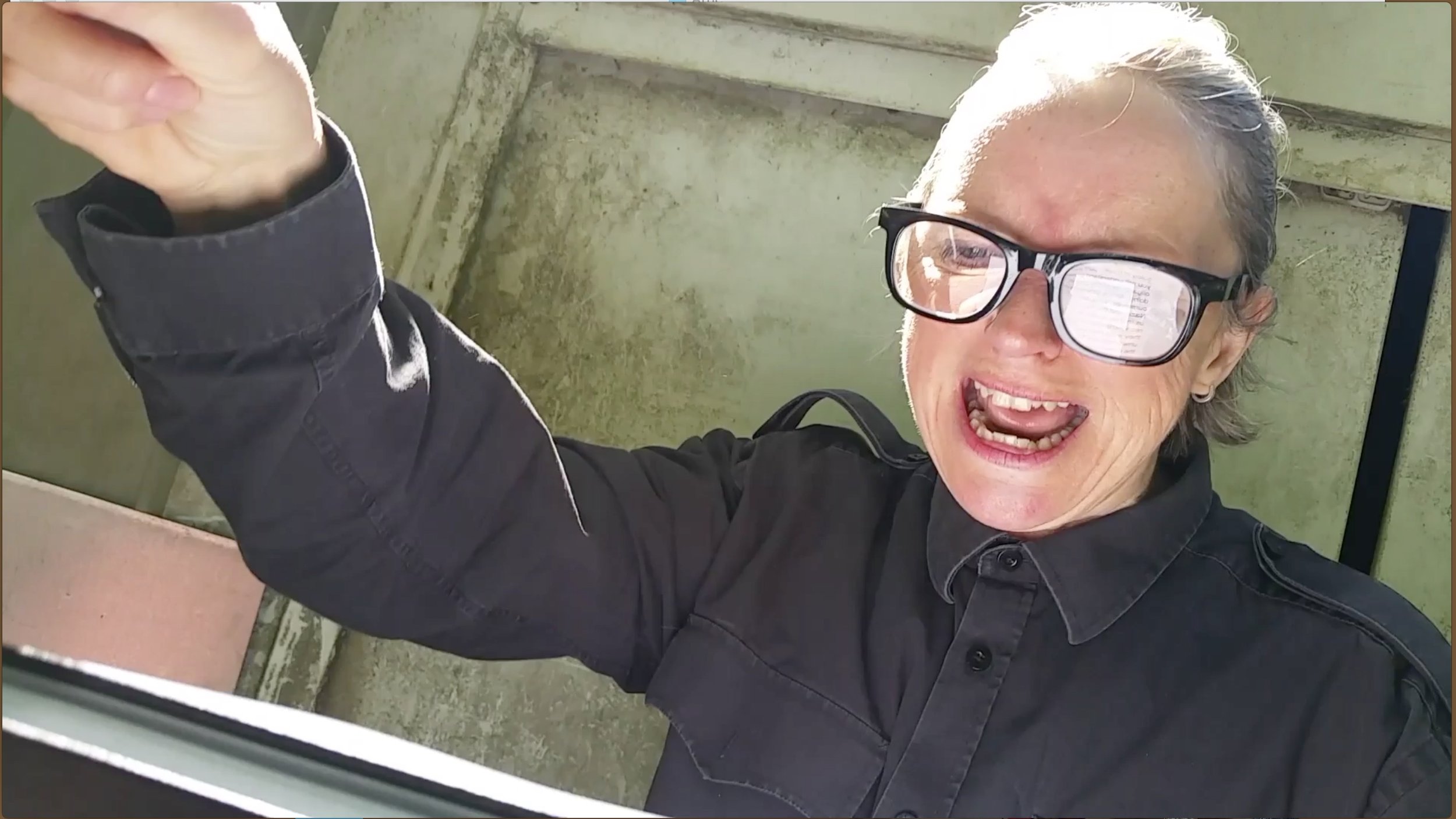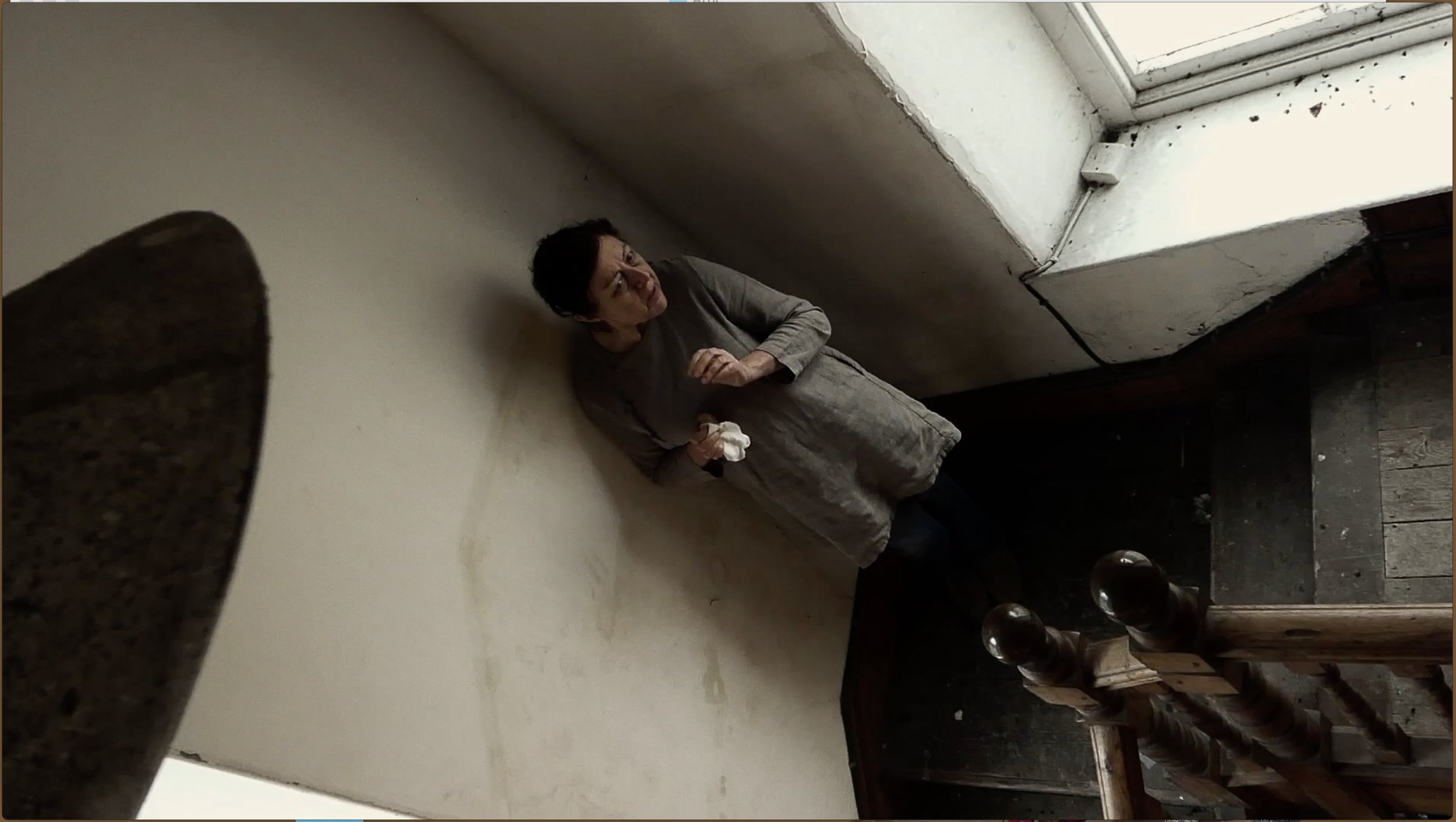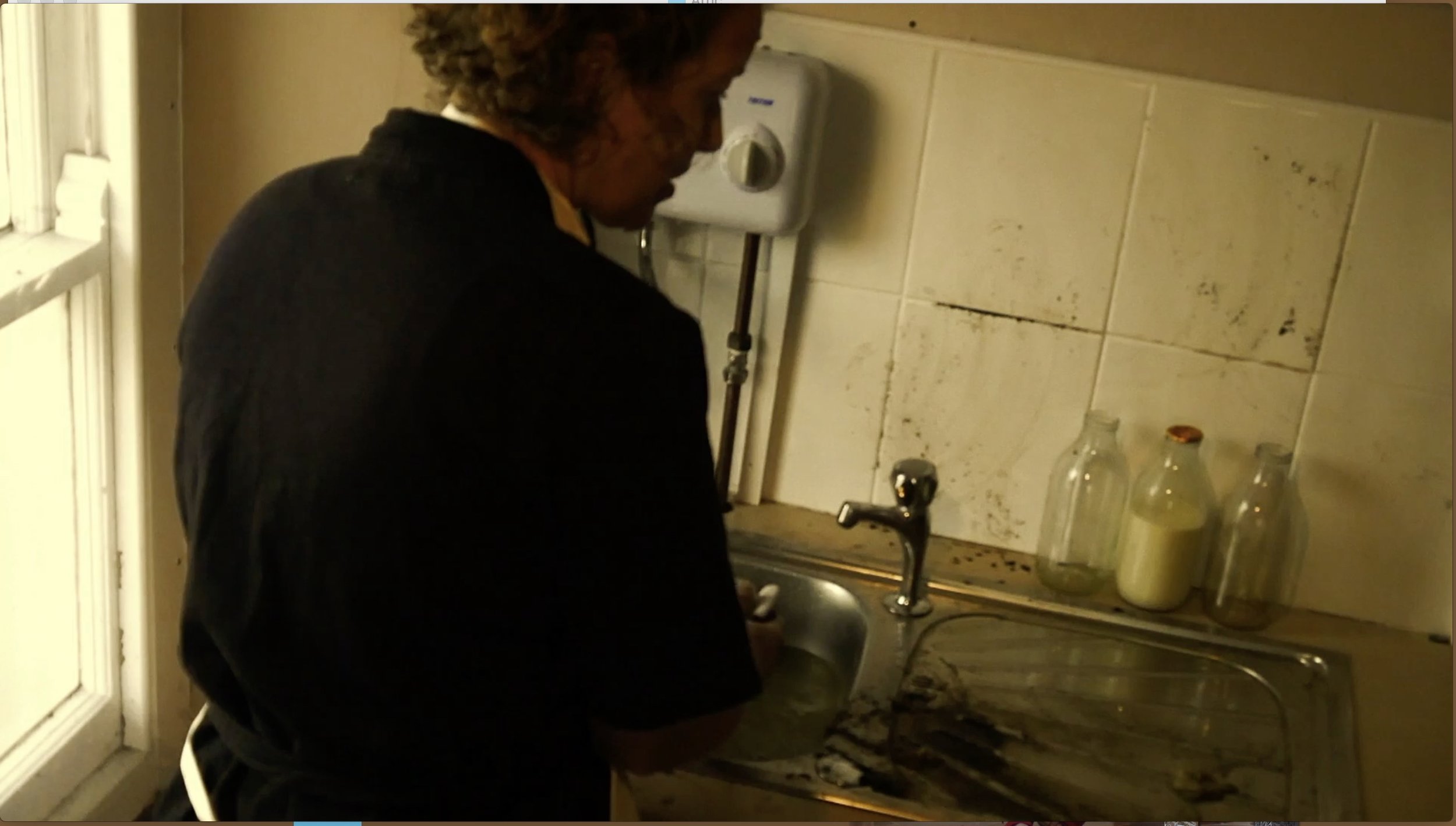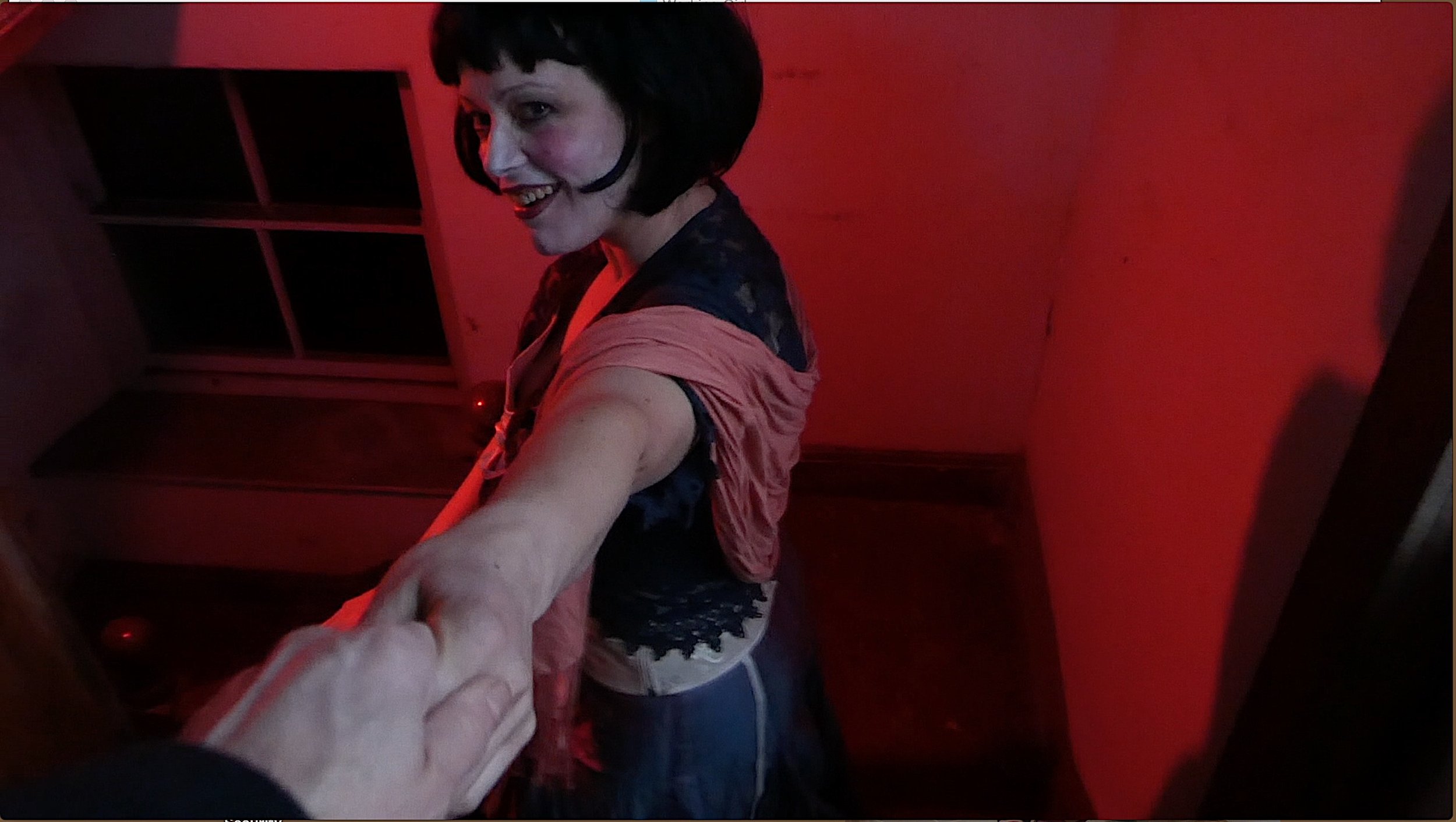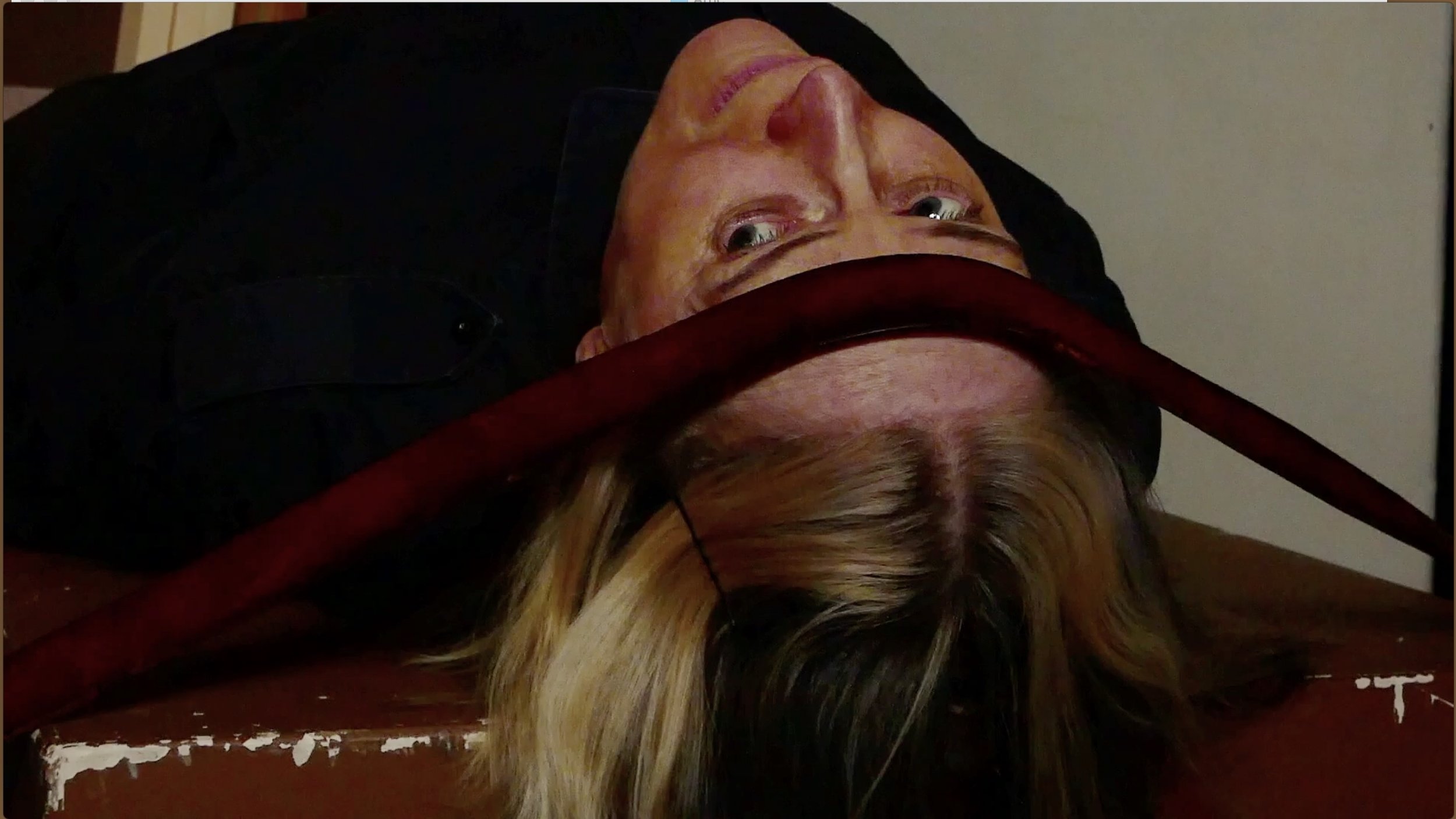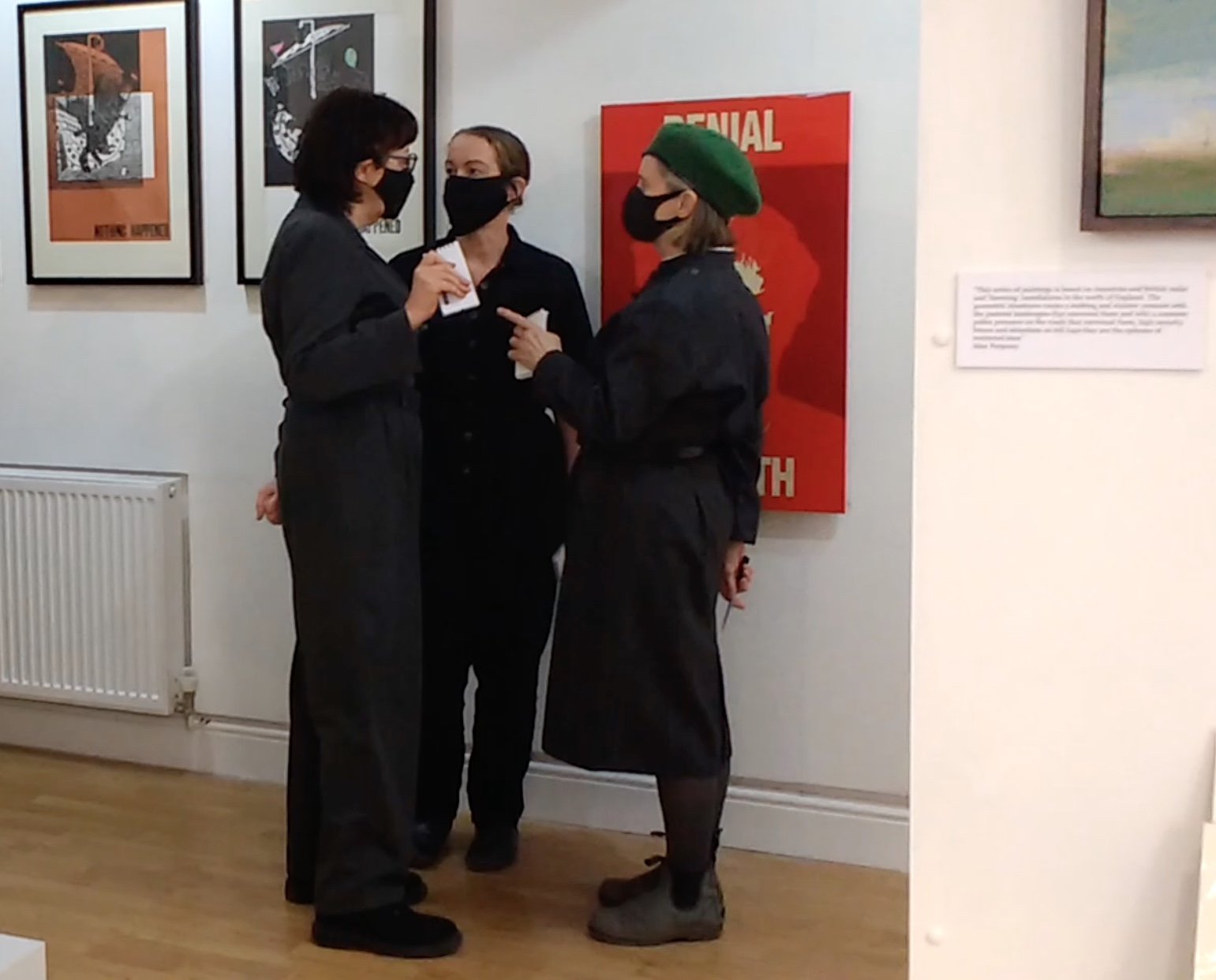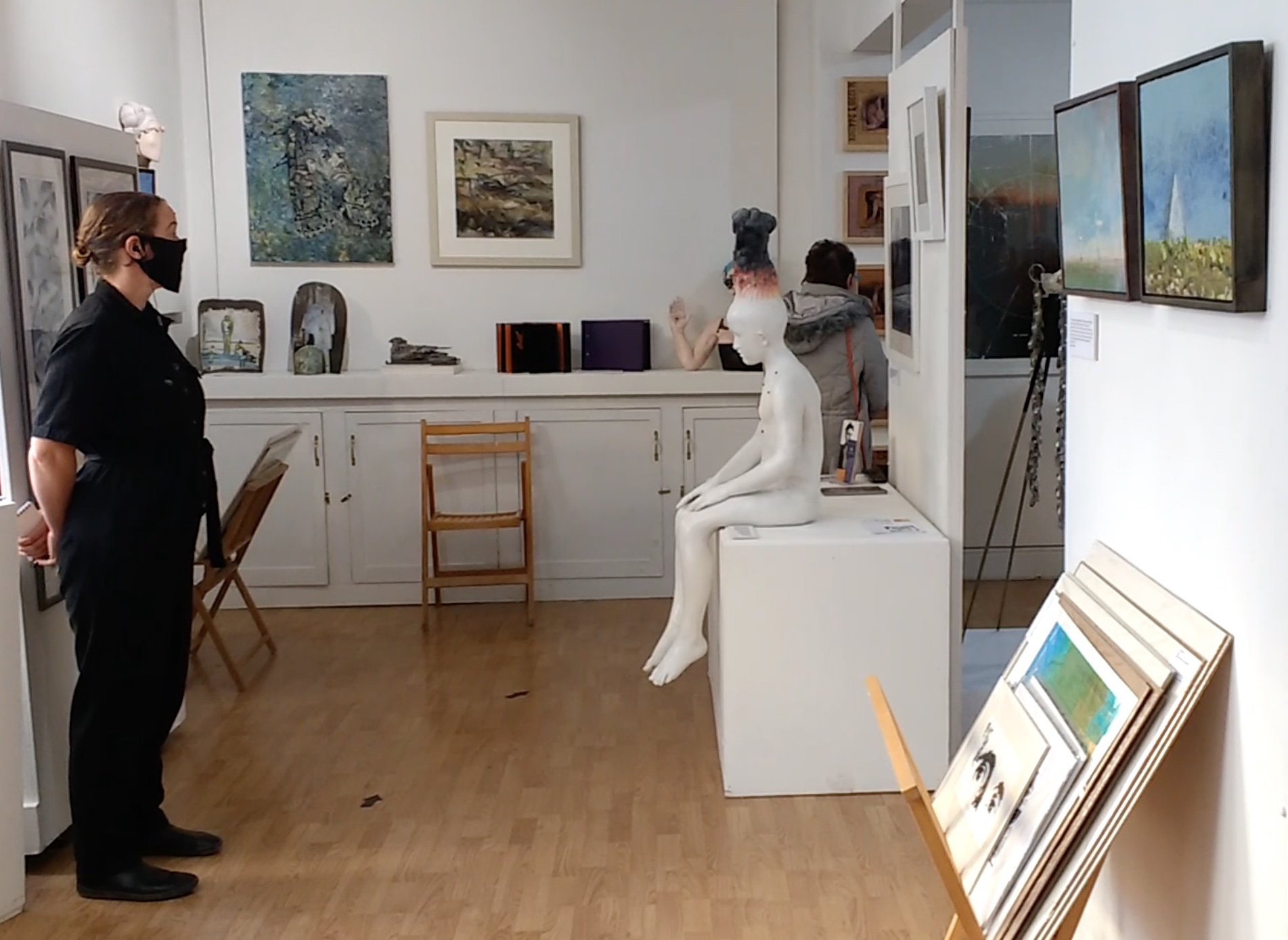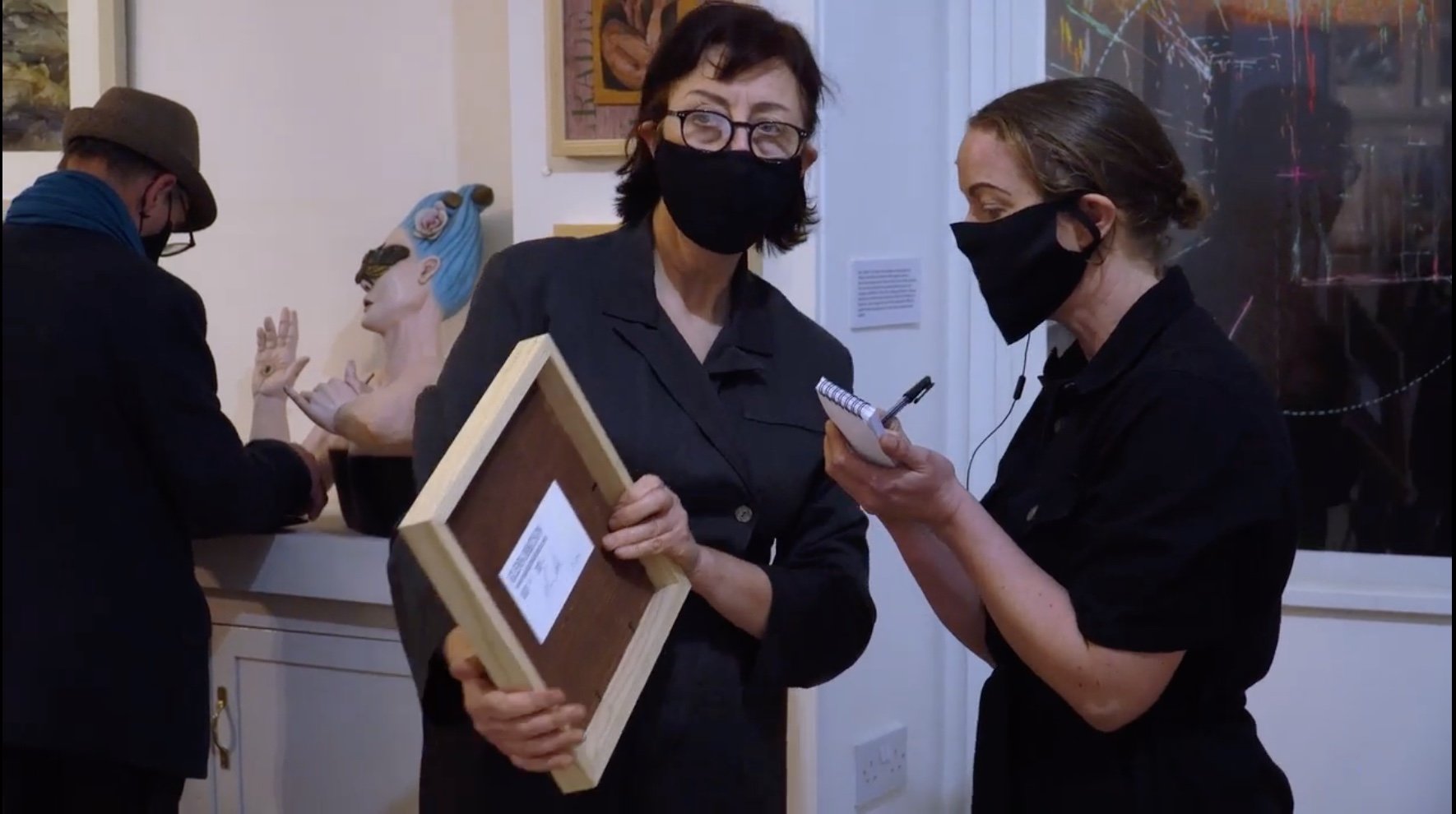C Claire Woolley
L Louise Weldon
M Melanie Davies
K Kay Margerison
G Glenn Ibbitson
G We first met during lockdown[ back in 2020, socially distanced in the car park in Newcastle Emlyn. I remember that the four of you [Kay Margerison, another of the Attic Players, was there too] were more enthusiastic than I could have hoped for. What were your preliminary thoughts and ideas? How did you pitch the Orwell theme to the Attic Players as a group? was the group just content to let you run with the project as a sideline to their main programme?
M when we first got together
C in the carpark -we were excited straight away
L After meeting in the car park we pitched the idea to the other Attic members,
M. It was a time of Covid, so people were doing other monologues
[Which can be viewed at: https://attictheatre.wales/during-covid/ ]
C because we met you we had more of a connection with the project. We felt it was something we all wanted to creatively engage with.
L I remember George Orwell from school where we read Nineteen Eighty-Four and was interested to revisit it and find out what his work was about. His writing is so clean and concise. He’s fascinating; he’s such a good writer.
M we were genuinely intellectually engaged with the subject matter. The theatre wants to join in with local events and engage with all sorts of things, and with this Orwell project, we were offered something and we just went “of course we want to do this!”
C it's great joining local events and that can be good advertising, whereas this felt like there could be some real artistic input
L Also relevant politically today. What’s going on. It was a relevant project. Plus; I do like to dress up
C Yeah, you do Lou
M So Lou; you did your piece first for one of our monologues.
L The first one was the shouty one I was just so driven by the project and keen. I got dressed up one day and said to Pete [Weldon], film this. No rehearsal; straight in; filmed in one take, and that was that..
M and then you came to ours to film a second monologue.
L The second scene was more considered and Mel and Peter [Mount] kindly helped with it.
M We all read the book .
C We decided that because time was quite short, we decided to focus in on Nineteen Eighty-Four after reading some of the other essays.
L Too much to filter. Nineteen Eighty-Four lets stick to that
C Its got nice strong themes
L Each of us would go away and work out a little piece that we thought was relevant.
G Sadly, Orwell is linked in some literary circles with Hemingway as a writer overly preoccupied by ‘male’ concerns. I was impressed that you switched the emphasis from Winston Smith to the women. You found relevance in the book from a female perspective which I felt heartened by.
C Because we are all female we focused on the female stories in it and we all saw the different facets of how women are represented in the book. That is what interested us most. We looked at the prole women and the women in the party and the mum and neighbour; guilty and terrorised by her children
M and Claire’s mother at the sink, intimidated by her own children
L My newsreader was just a generic ‘shouty, shouty’.
C You had the idea of having more of a political reference linking with today.
L I looked at the ‘Police, Crime, Sentencing and Courts Bill’ and I picked themes out of that and into the newsreader’s pitch to the people added in to make it link and connect to what is relevant today; which is shocking.
C so we had the idea of looking at the women in the book. We then pieced together scripts
M Individually
C finding relevant bits of the book. I felt that, for me, the prostitute was one of the strongest female images. That image of the prostitute as being superficially very pretty but then getting up close and realising she is quite old and haggard and clearly desperate, was for me one of the strong images in the book
K Lou, why did you do the rat in the cage?
M its a good image
L My memory of reading the book as a young person was that cage
M it’s the abiding image of that whole book
L It’s horrendous, isn’t it?
G Your film, ‘Thought Police 4891’ is very episodic; when editing, I realised that the tableaux could be arranged in any order. Was that deliberate in your working method?
M It kind of made sense because of the short time frame we had to put it together;
reading separately, researching separately then coming together with our stuff made sense
L It was the only way to do it in the time given.
M We didn’t want to meet together all the time and rehearse a play
C Or write a script for it
L The way we devised it we came together and discussed and went away and worked out our bits and came back together.
C and we like each other; we trust each other.
M and we are thinking differently to perhaps a lot of people who contributed to the exhibition, who work individually, we very much work as a group. All our contributions are accepted , talked through, then, because there is a lack of ego in this particular group of women, none of us are going, “Me. I’m doing it. my thing is the best thing.”
C Though Mel is mostly always right.
M There is that, yeah.
L We would go away and come back knowing that each of us had given it our best shot and had listened to what we had discussed in a previous rehearsal so that it did all meld.
M and we are prepared to give things up.
G Would you consider adding scenes to what you have already done? I know that you Mel, had a ‘watcher’ episode, which I didn’t think through properly before our video shoot. Mea culpa.
M Being watched does play into the women thing. I know they are all being watched. We are all interested in the role women play in the world generally and that is something the we naturally go to as a starting point for work.
C If we had had more time I would have also really have liked to have done the dark haired girl who’s following behind Winston, spying on him. Who is this person? Can I trust them?
L I would like to look at Julia’s back story How? Where What? Explore her character.
C The torture scene; we didn’t plan that at all it wasn’t worked out beforehand
M It came out of improvisation skills. and our working together on other things. our past work together informs this work.
G Your other contribution to the room 103 project was your ‘Exhibition Security’; a piece performed on the preview evening. what was the thinking behind that? To what extent were your movements around the room pre-planned and to what extent did you have to respond to the space itself?
L I thinks its fun to dress up and do something that is alive, in person, right now, right then. I like art that has that shock element
M I agree. I think that we put that into our work. I definitely put that into my writing. It’s about not making people feel comfortable where they are; what they’re looking at.
Glenn definitely does that with his work; a lot of the work in the exhibition was like that so of course it made sense for our work to be uncomfortable as well and people were uncomfortable.
C and practically we wanted something that we could do without having to learn lots of lines or do lots of rehearsal and with minimal costume. Develop something in a quite organic way around a simple idea. We found some phrases from the book and we had little note pads
M that was really helpful.
L The space was smaller than I had imagined so that was a challenge initially but that did help us work together because we didn’t have far to move.
C We had preplanned triangulation, with one being in charge and responding to the others together as a trio.
M We played with it; it didn’t stay solid that one would move all the time, but we had a starting point.
C We also talked through the idea; how it might make people so uncomfortable and how to minimise that.
L How far to go with it.
C We didn’t want to strip-search anyone .We did talk about that to begin with then we sort of went away from that. It might have been a bit familiar…
L What I found being in character and staying in character, I was prepared for people feeling uncomfortable. I was very aware that they had come to a pleasant evening and how far did I make them feel uncomfortable so I was very aware of stepping back sometimes if somebody looked as if “I just want to look at the painting, please go away”.
C Another interesting response was when I walked purposefully across the room and ended up banging into a guy and he pushed me back. He really didn’t like it. I didn’t want to start a fight, so I ignored it.
M I’ve had that experience a lot and it is usually people who can’t really play. They are not comfortable playing the game. other people go along with it; “I know your not real” and they have no issues at all. There was another woman who didn’t get it; she just walked across and away….
but thats the skill isn’t it? How far it’s ok to go. That person who might hit you around the head, they might shout at you so you don’t want to push them too far.
C How far can you push an audience?
M Its important that the audience think and feel something. Whats the point of it if you’re going to go “oh that’s nice”, and walk on? You want to affect something and with this it was really quite easy because being intimidating is very affecting. We don’t usually go into art galleries and expect to feel fearful of people. You only have to stand too close to someone and say “Name” and that’s it, they can feel uncomfortable. People did feel uncomfortable; a lot of people did.
C One of the interesting incidents was when I did was pretending to talk into my earpiece and said “the person on the blue jumper? Yes, I’m watching them..” and you could see people tense when their heard the piece of clothing they were wearing mentioned.
L “Have I Got a blue jumper?”
G You certainly raised eyebrows by interacting physically with some of the artwork…
C Well that was your fault Glenn. You told us to turn the pictures round so if there were eyebrows raised, that was down to you.
M It actually worked really well Did you notice people saying “they’re touching the pictures”?
L especially when someone was there looking at it and you go up to turn it round in front of them…
C I enjoyed doing it
L Is that like breaking the fourth wall?
M Yes, probably it is actually.
L stepping over a boundary you cant touch artwork. What?
C That’s Glenn’s fault
G How easy was it finding the character?
C We were helped by the costume and how we did our makeup.
the masks actually helped
M I really liked the masks; dehumanising.
C when we realised that we going to have to wear the masks I was…[grumble]..
-and actually it really helped I felt, because it hid you and it meant you were
L just the eyes -which is very Orwellian. It honed in the attention. We weren’t gurning with our mouths.
C you’re anonymised aren’t you? It is used quite often to inflict violence; like the executioner having to have a face covering to inflict violence on people and not own up to your own identity
L Depersonalised.
M I found it quite empowering because going up close to a man or a woman, but particularly getting into a man’s face and asking them a direct question. I loved doing that.
L You were very good on the door. Very intimidating. “Get in!”
M “Hurry up!”
L I found it quite easy to get into character because we came at it professionally and wanted to do a good job
C and we’d read the book so we understood the underlying feel of what ‘The Party’ was about. Intimidating; taking away people’s enjoyment, really.
G As a non-actor, it always amazes me how you can play against type so well and switch in and out of role -fortunately for the rest of us who shared the supper table with you after the preview. How easy is that for you?
L coming out of character was quite tricky
C I found it quite hard actually
L When people said, “you can stop now.”.
C I couldn’t because I was in the same space and there were still people there, so it helped me to go to the bathroom and take my stuff off. Then I was fine.
M Ok, That’s always interesting. People may be thinking, “Is the person I have just seen on stage the same as the person I’m now seeing?. Are they really a nasty person who is going to come into my space and shout at me?” What I’ve done in the past is be ‘more nice’ than I really need to be. Trying to reassure, I don’t want people to think i’m horrible, do I? I probably get myself back that way.
L I love the acting because you can do stuff that is so not you; that is such fun because I am not a shouty aggressive person in real life, but to play that was; “yes, c’mon. I wanna be the baddie.”
C Do most actors like being a baddie? I cant imagine not wanting to be a baddie. The joy of playing someone so different to you and do things you wouldn’t normally do.
M I don’t think everyone would be able to do what we did. I think some people would find it hard to find the horrible bit of themselves.
L Oh that’s really easy.
M some people wouldn’t. some people would think “everyone will think that’s me. I don’t want people to think I’m a horrible person.”
C I didn’t take that thought in to dinner afterwards. I didn’t think people would think that we were those characters. If I had, I would have been more n ervous approaching the dinner.
M that’s a really interesting line crossing from you to your character; a really interesting line…
G A [foot]note courtesy of Quentin Kopp, Chair of the Orwell Society.
“Just a little note to say thank you for a wonderful evening and a great exhibition. I thought your actors were great.”
Glenn Ibbitson April 2022


